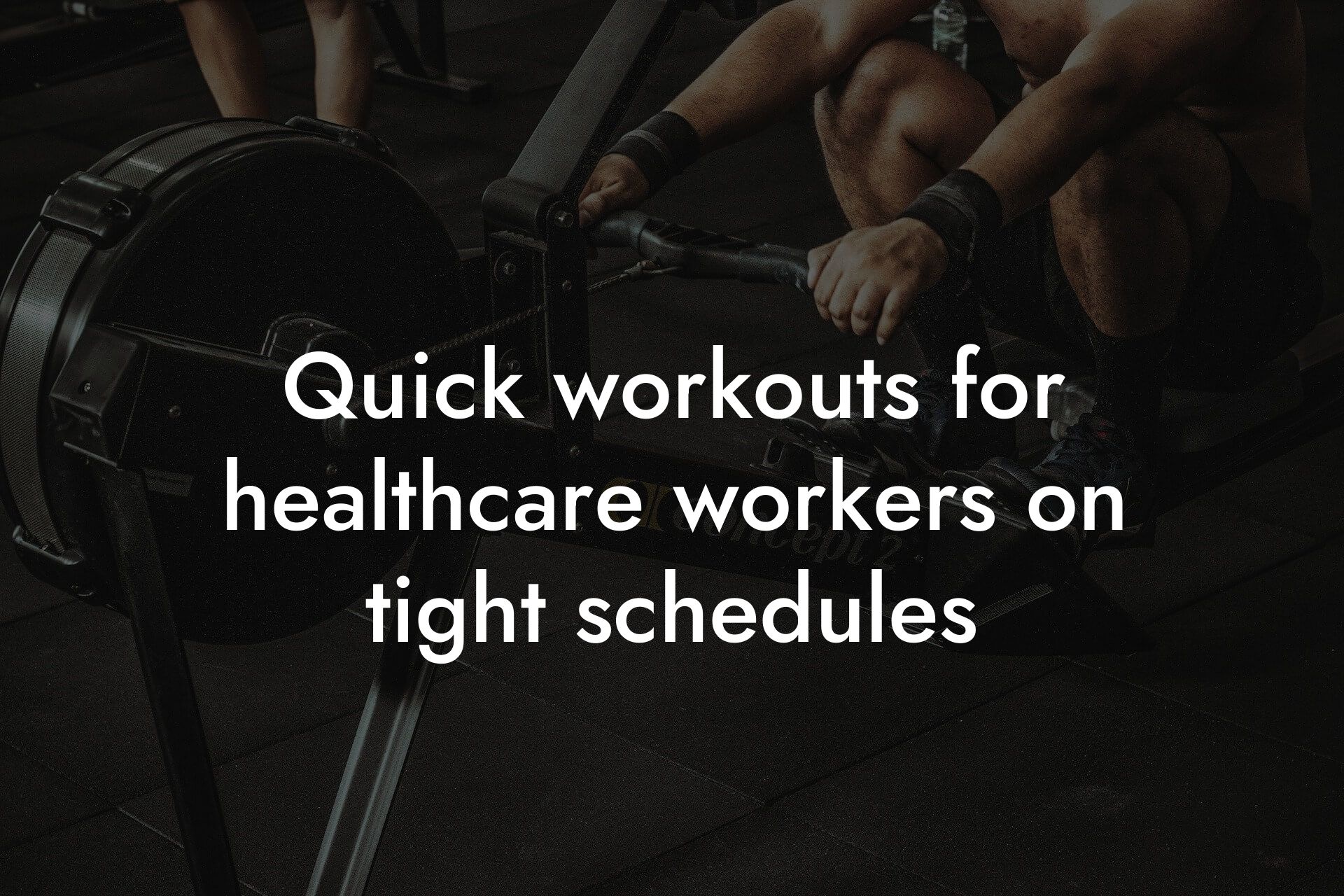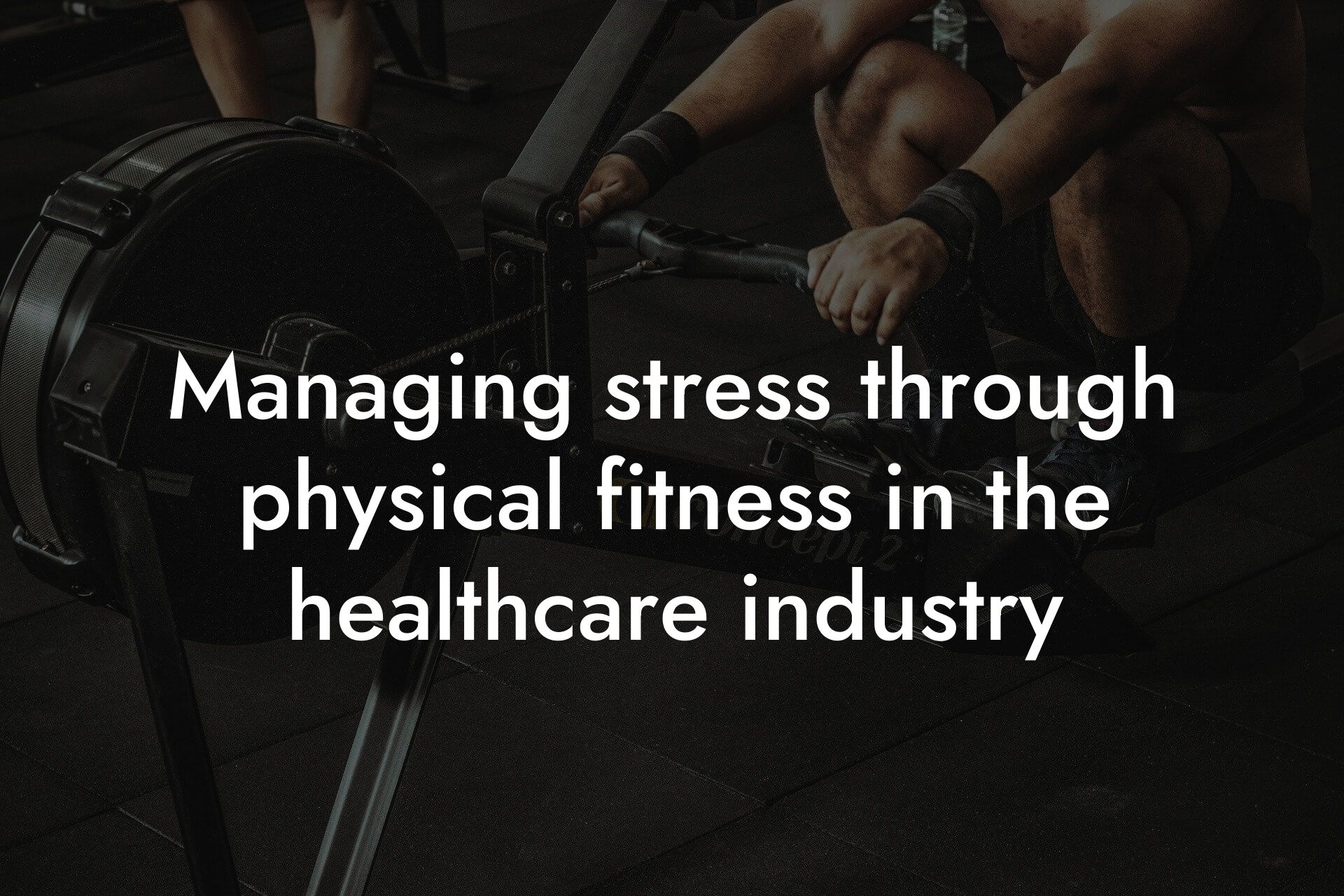As a healthcare professional, you understand the importance of maintaining your physical fitness and overall well-being. However, with long shifts and demanding schedules, it can be challenging to prioritize your own health. At Tano Performance Group, we recognize the unique challenges faced by healthcare professionals and are committed to providing you with the tools and information you need to maintain your fitness and physique despite your busy schedule.
Table of Contents
- The Importance of Fitness for Healthcare Professionals
- Challenges Faced by Healthcare Professionals
- Creating a Fitness Plan That Works for You
- Incorporating High-Intensity Interval Training (HIIT)
- Nutrition and Meal Planning
- Getting Enough Rest and Recovery
- Staying Motivated and Accountable
- Frequently Asked Questions
The Importance of Fitness for Healthcare Professionals
As a healthcare professional, you are no stranger to the importance of physical fitness. You spend long hours on your feet, lifting patients, and performing physically demanding tasks. Maintaining your fitness level is crucial to ensuring that you can continue to provide high-quality care to your patients while also reducing your risk of injury and burnout. Furthermore, being physically fit can also improve your mental health and overall job satisfaction.
Challenges Faced by Healthcare Professionals
Despite the importance of fitness, healthcare professionals often face unique challenges that make it difficult to prioritize their own health. Long shifts, irregular schedules, and high-stress environments can make it challenging to find time to exercise, prepare healthy meals, and get enough rest. Additionally, the physical demands of the job can leave you feeling exhausted and drained, making it even harder to muster the energy to engage in physical activity.
Creating a Fitness Plan That Works for You
So, how can you maintain your fitness despite the challenges of your job? The first step is to create a fitness plan that works for you and your schedule. This may involve identifying small pockets of time throughout your day to engage in physical activity, such as taking the stairs instead of the elevator or doing a few jumping jacks during your breaks. It may also involve finding a workout buddy or joining a fitness class to provide accountability and motivation.
At Tano Performance Group, we recommend using our DEXA machine to get a complete body assessment and identify areas for improvement. Our machine provides detailed information about your body composition, bone density, and other key health metrics, giving you a clear picture of your overall fitness level and helping you to set realistic goals.
Incorporating High-Intensity Interval Training (HIIT)
One effective way to fit exercise into your busy schedule is through high-intensity interval training (HIIT). HIIT involves short bursts of intense physical activity followed by brief periods of rest. This type of training is ideal for healthcare professionals because it can be done in short periods of time and can be adapted to fit your individual fitness level.
For example, you could try doing a series of burpees or jump squats during your breaks, or incorporate strength training exercises into your daily routine. The key is to find activities that you enjoy and that can be done in short periods of time, making it easier to fit them into your busy schedule.
Nutrition and Meal Planning
Proper nutrition is also critical to maintaining your fitness level. As a healthcare professional, you understand the importance of fueling your body with healthy foods to support your physical activity. However, with long shifts and irregular schedules, it can be challenging to prepare healthy meals.
One strategy is to prep healthy meals in advance, such as cooking a batch of rice and vegetables on your days off and reheating them throughout the week. You can also consider meal delivery services or healthy take-out options to make it easier to eat healthy on the go.
Getting Enough Rest and Recovery
Getting enough rest and recovery is also critical to maintaining your fitness level. As a healthcare professional, you understand the importance of getting enough sleep to support your physical and mental health. However, with long shifts and irregular schedules, it can be challenging to get enough rest.
One strategy is to prioritize sleep and make it a non-negotiable part of your daily routine. This may involve establishing a relaxing bedtime routine, avoiding caffeine and electronics before bedtime, and creating a sleep-conducive environment. You can also consider taking power naps during your breaks or using relaxation techniques such as deep breathing or meditation to help manage stress and fatigue.
Staying Motivated and Accountable
Finally, staying motivated and accountable is critical to maintaining your fitness level. As a healthcare professional, you understand the importance of setting goals and tracking progress. One strategy is to set specific, measurable, and achievable fitness goals and track your progress using a fitness tracker or mobile app.
You can also consider finding a workout buddy or joining a fitness community to provide accountability and motivation. At Tano Performance Group, we offer a range of resources and support to help you stay motivated and on track, including personalized coaching and group fitness classes.
Maintaining your fitness level as a healthcare professional can be challenging, but it is not impossible. By creating a fitness plan that works for you, incorporating high-intensity interval training, prioritizing nutrition and meal planning, getting enough rest and recovery, and staying motivated and accountable, you can maintain your physical fitness and overall well-being despite the demands of your job. At Tano Performance Group, we are committed to providing you with the tools and resources you need to take your fitness to the next level. Contact us today to learn more about our DEXA machine and how it can help you achieve your fitness goals.
Frequently Asked Questions
What are the common challenges healthcare professionals face in maintaining fitness?
Healthcare professionals often work long and irregular shifts, which can disrupt their routine and make it difficult to prioritize fitness. Additionally, the high-stress nature of their job can lead to burnout, making it even harder to find the energy and motivation to exercise. Furthermore, the physical demands of their job can leave them feeling exhausted, making it challenging to engage in physical activity outside of work.
How can healthcare professionals prioritize fitness despite their busy schedules?
Healthcare professionals can prioritize fitness by scheduling exercise into their daily routine, just as they would any other important appointment. They can also find ways to incorporate physical activity into their daily commute, such as taking the stairs instead of the elevator or walking to work. Additionally, they can look for opportunities to move more during their breaks at work, such as taking a short walk or doing a few jumping jacks.
What are some quick and effective workouts that healthcare professionals can do during their breaks?
Healthcare professionals can do quick and effective workouts during their breaks, such as bodyweight exercises like push-ups, squats, and lunges, or high-intensity interval training (HIIT) workouts that can be completed in just a few minutes. They can also do some stretching exercises to help reduce stress and improve flexibility.
How can healthcare professionals stay motivated to exercise despite their long shifts?
Healthcare professionals can stay motivated to exercise by setting specific and achievable fitness goals, finding a workout buddy or accountability partner, and rewarding themselves for reaching their goals. They can also focus on how exercise improves their overall well-being and job performance, rather than just the physical benefits.
What are some healthy snack options that healthcare professionals can bring to work?
Healthcare professionals can bring healthy snack options to work, such as nuts, fruits, carrot sticks with hummus, energy bars, and trail mix. They can also prepare their own snacks in advance, such as hard-boiled eggs, cut veggies, and protein smoothies.
How can healthcare professionals stay hydrated during their long shifts?
Healthcare professionals can stay hydrated during their long shifts by bringing a refillable water bottle to work and sipping on it throughout the day. They can also avoid sugary drinks and caffeine, which can dehydrate them further.
What are some stress-reducing techniques that healthcare professionals can use during their breaks?
Healthcare professionals can use stress-reducing techniques during their breaks, such as deep breathing exercises, meditation, and yoga. They can also listen to calming music, take a short walk outside, or practice gratitude journaling.
How can healthcare professionals get enough sleep despite their irregular schedules?
Healthcare professionals can get enough sleep despite their irregular schedules by establishing a consistent sleep schedule, creating a relaxing bedtime routine, and avoiding caffeine and electronics before bedtime. They can also use earplugs, eye masks, and blackout curtains to create a sleep-conducive environment.
What are some benefits of prioritizing fitness for healthcare professionals?
Prioritizing fitness can have numerous benefits for healthcare professionals, including improved physical and mental health, increased energy levels, and enhanced job performance. It can also reduce the risk of burnout and improve overall well-being.
How can healthcare professionals incorporate fitness into their daily commute?
Healthcare professionals can incorporate fitness into their daily commute by walking, cycling, or taking public transportation instead of driving. They can also get off the bus or train a few stops earlier and walk the rest of the way to work.
What are some common myths about fitness that healthcare professionals should be aware of?
Healthcare professionals should be aware of common myths about fitness, such as the idea that they need to spend hours at the gym to see results, or that they need to be in perfect shape to start exercising. They should also be aware that fitness is not a one-size-fits-all approach, and that it's essential to find a routine that works for them and their lifestyle.
How can healthcare professionals find a workout routine that suits their lifestyle?
Healthcare professionals can find a workout routine that suits their lifestyle by experimenting with different types of exercise, such as running, swimming, or yoga. They can also consult with a fitness professional or do online research to find a routine that fits their schedule and goals.
What are some common mistakes that healthcare professionals make when it comes to fitness?
Healthcare professionals may make common mistakes when it comes to fitness, such as not setting realistic goals, not listening to their bodies, and not incorporating rest days into their routine. They may also focus too much on aesthetics and not enough on overall health and well-being.
How can healthcare professionals make fitness a priority despite their demanding job?
Healthcare professionals can make fitness a priority despite their demanding job by scheduling it into their daily routine, finding a workout buddy or accountability partner, and focusing on the benefits of fitness beyond just physical appearance. They can also prioritize self-care and make time for activities that bring them joy and relaxation.
What are some benefits of group fitness classes for healthcare professionals?
Group fitness classes can have numerous benefits for healthcare professionals, including accountability, social support, and motivation. They can also provide a sense of community and camaraderie, which can be especially important for healthcare professionals who may feel isolated or burnt out.
How can healthcare professionals incorporate strength training into their fitness routine?
Healthcare professionals can incorporate strength training into their fitness routine by using free weights, resistance bands, or machines at the gym. They can also do bodyweight exercises, such as push-ups, squats, and lunges, or incorporate strength training into their daily activities, such as carrying heavy equipment or doing yard work.
What are some benefits of high-intensity interval training (HIIT) for healthcare professionals?
HIIT can have numerous benefits for healthcare professionals, including improved cardiovascular health, increased calorie burn, and enhanced insulin sensitivity. It can also be a time-efficient way to exercise, which can be especially important for healthcare professionals with busy schedules.
How can healthcare professionals make healthy food choices despite their busy schedules?
Healthcare professionals can make healthy food choices despite their busy schedules by meal prepping, packing healthy snacks, and avoiding fast food and processed meals. They can also prioritize whole, unprocessed foods, such as fruits, vegetables, and lean proteins.
What are some common barriers to fitness that healthcare professionals may face?
Healthcare professionals may face common barriers to fitness, such as lack of time, energy, or motivation. They may also face physical barriers, such as injury or illness, or emotional barriers, such as low self-esteem or body dissatisfaction.
How can healthcare professionals overcome these barriers to fitness?
Healthcare professionals can overcome barriers to fitness by setting realistic goals, finding a workout routine that they enjoy, and seeking support from friends, family, or a fitness professional. They can also focus on the benefits of fitness beyond just physical appearance, such as improved mental health and job performance.
What are some resources that healthcare professionals can use to prioritize fitness?
Healthcare professionals can use a variety of resources to prioritize fitness, including fitness apps, online workout platforms, and fitness professionals. They can also use resources specific to their profession, such as the American Nurses Association's (ANA) fitness initiative or the American Medical Association's (AMA) wellness program.
How can healthcare professionals prioritize self-care and wellness?
Healthcare professionals can prioritize self-care and wellness by making time for activities that bring them joy and relaxation, such as reading, meditation, or spending time with loved ones. They can also prioritize sleep, nutrition, and exercise, and seek support from friends, family, or a mental health professional when needed.
What are some benefits of prioritizing self-care and wellness for healthcare professionals?
Prioritizing self-care and wellness can have numerous benefits for healthcare professionals, including improved mental health, increased job satisfaction, and enhanced overall well-being. It can also reduce the risk of burnout and improve patient care.
Here are some related articles you might love...
- Quick workouts for healthcare workers on tight schedules
- Nutrition strategies for energy during long surgeries
- Managing stress through physical fitness in the healthcare industry
- The connection between body composition and job performance in healthcare
- How to maintain bone density in physically demanding healthcare roles
- The impact of physical health on patient care
- How DEXA scans can benefit healthcare professionals
- How to balance night shifts with fitness goals
- The importance of fitness for preventing healthcare worker burnout
Zak Faulkner
Zak Faulkner is a leading authority in the realm of physical health and body composition analysis, with over 15 years of experience helping professionals optimise their fitness and well-being. As one the experts behind Tano Performance Group, Zak has dedicated his career to providing in-depth, science-backed insights that empower clients to elevate their physical performance and overall health.
With extensive knowledge of DEXA technology, Zak specializes in delivering comprehensive body assessments that offer precise data on body fat, muscle mass, bone density, and overall physique. His expertise enables individuals to make informed decisions and achieve their fitness goals with accuracy and confidence. Zak’s approach is rooted in a deep understanding of human physiology, combined with a passion for helping clients unlock their full potential through personalised strategies.
Over the years, Zak has earned a reputation for his commitment to excellence, precision, and client-focused service. His guidance is trusted by top professionals who demand the best when it comes to their health. Whether advising on fitness programs, nutritional strategies, or long-term wellness plans, Zak Faulkner’s insights are a valuable resource for anyone serious about taking their health and fitness to the next level.
At Tano Performance Group, Zak continues to lead our Content Team revolutionising how professionals approach their physical health, offering unparalleled expertise that drives real results.




